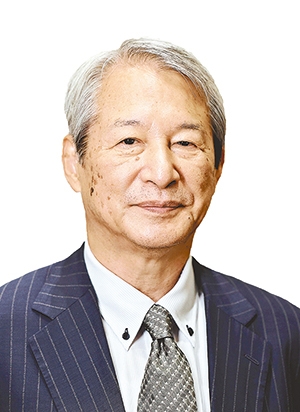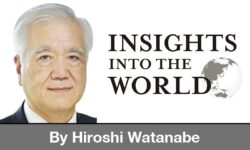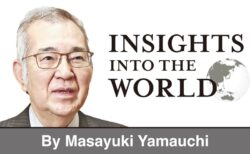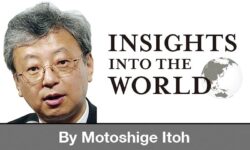11:00 JST, August 23, 2024
Diplomacy with so-called Global South emerging and developing countries has become more important than ever over the past year and a half.
India and Brazil have regularly participated in the Group of Seven forum of industrialized countries as partner countries. Indonesia and Vietnam, among other emerging nations, were also invited to the G7 summit held in Hiroshima in 2023. The G7 summit in 2024 took place in Puglia, Italy, with the participation of countries including Algeria, Argentina, Jordan, Kenya, Tunisia, Turkey and the United Arab Emirates.
Chinese President Xi Jinping and Russian President Vladimir Putin agreed in a bilateral summit in Beijing, held in May this year, that they would unite the Global South through the frameworks of the BRICS group of major emerging economies and the Shanghai Cooperation Organization (SCO).
The term “Global South” has become a catch-all phrase for “emerging and developing economies,” as opposed to “advanced economies” — a loose definition that aligns with the International Monetary Fund’s classification of countries in its biannual World Economic Outlook surveys. China and Russia position themselves as “major emerging economies,” acting like Global South leaders. However, almost no one in Japan, Australia, the United States and Europe regards China or Russia as part of the Global South. How to define the Global South has emerged as a point of contention in the theater of international politics.
Why now?
Why is the Global South important? One obvious reason is the increasing weight of emerging and developing economies in the world economy. The Global South economies sharply increased their combined share of the world economy from 20% in 2000 to 42% in 2023.
The leaders of BRICs, an acronym for Brazil, Russia, India and China, invited South Africa in 2011 to join the group and began calling it BRICS, adding an “S” for South Africa. In the wake of the global financial crisis of 2008, the G7 and other advanced economies joined together with major emerging economies and the European Union to create the Group of 20 forum of leaders, a development that reflects how rapid the rise of emerging economies has been.
If China’s share of the global economy (16.9%) and Russia’s (1.8%) are subtracted from the emerging and developing countries’ combined share of 42% as of 2023, the Global South’s share stands at about 23%. This can be said to be the actual global share of those countries we consider to be Global South economies. The country-by-country shares of six of them are 1% or more — 3.6% for India, 2% for Brazil, 1.7% for Mexico, 1.4% for Indonesia, 1.1% for Turkey and 1% for Saudi Arabia. The six countries’ combined figure is 10.8% or nearly half of the total excluding China and Russia.
Country-by-country figures should not, however, be taken as the most important indicator. The combined global economic share of the six major economies of the Association of Southeast Asian Nations is about the same as that of India. South Africa is a major country in Africa, but its economy is smaller than that of Malaysia or the Philippines.
Another reason for the Global South’s growing importance is the rivalry between the United States-led “free world” and the “Eurasian partnership” centered on China and Russia. Since Russia’s invasion of Ukraine, the rivalry has so intensified that both sides have found it important to reach out to those countries that would rather keep both of them at arm’s length.
How are Global South countries reacting to the prevailing international circumstances? Many of them feel little ownership of the U.S.-led world order that has been forged by advanced countries. Further, there are many Global South countries that were once colonized by advanced nations, and strong feelings of anti-colonialism remain.
In the Global South countries with large Muslim populations, many of their people, who have witnessed Israel’s armed offensive and the resulting humanitarian crisis in the Palestinian autonomous area of the Gaza Strip, castigate the United States for its “double standards” on Israel and Ukraine, which Washington fully backs.
To understand the actions of countries with economies above a certain size, we must look at their geopolitical and geo-economic positions and their domestic political situations.
As mentioned above, South Africa is a major country in Africa. But Africa itself is not a main arena of the competition between the free world and the Eurasian partnership. For that reason, domestic politics informed by the legacy of anti-colonialism are still given priority. In February 2023, on the first anniversary of Russia’s invasion of Ukraine, South Africa held a joint military exercise with China and Russia.
South Asia is not at the crux of the competition between the major powers either. Border skirmishes between India and China show no signs of ending soon. In June 2020, an India-China border clash left scores of soldiers on both sides dead or wounded. India and Russia committed themselves to the “Special and Privileged Strategic Partnership” in 2010 and agreed at an India-Russia summit in 2021 to promote military-technical cooperation and joint production of weapons.
India is a member of BRICS and the SCO, but it also participates in the Quad, which also includes Japan, the United States and Australia. Despite having become a regular G7 summit participant, India did not sign a joint communique issued by the Summit on Peace in Ukraine, held in Switzerland in June this year. India attaches importance to retaining autonomy, to ensure that it can have as many strategic options as possible.
U.S.-China face-off
On the other hand, Southeast Asia, alongside Taiwan, is at the center of the U.S.-China competition. Although China is ASEAN’s largest trading partner, the regional association’s combined trade with Japan, the United States, the EU and other advanced economies is larger than that with China. For the 10-nation regional group, the United States has been the largest investor.
For each of the six major countries within ASEAN — Indonesia, Malaysia, the Philippines, Singapore, Thailand and Vietnam — the U.S. military presence is a given on which they base their respective national security policies. In other words, the United States and China are both important to ASEAN as a whole, making the group unable and unwilling to take sides.
Their policy choices differ considerably, however. While pledging to remain “non-aligned and neutral,” Indonesia has recently become increasingly active in holding joint military exercises with Japan, the United States and Australia. Indonesia welcomes investment from China, but at the same time it aims to become a member of the Organization for Economic Cooperation and Development (OECD) and shows interest in joining the Comprehensive and Progressive Agreement for Trans-Pacific Partnership (CPTPP).
Malaysia, which is a signatory to the CPTPP, has applied to join the BRICS group of emerging economies. The country has expressed concern about the AUKUS security framework that involves the United States, the United Kingdom and Australia, but Malaysia is known as one of Australia’s close military partners.
The Philippines is an ally of the United States and has become a “quasi-ally” of Japan. It has been at loggerheads with China over contested territorial claims in the South China Sea. The Philippines does not count on China for economic cooperation, and promotes the Luzon Economic Corridor project with Japan and the United States.
Thailand, too, is an ally of the United States, but it does not see China as a threat. Reflecting its policy of prioritizing economic development, the country has applied to join both BRICS and the OECD.
Vietnam remains adamantly against yielding to China over the South China Sea territorial disputes. The intensification of the U.S.-China face-off has led to an increase in Chinese investment, but Vietnam is wary of China’s economic coercion. In 2023, Vietnam elevated its bilateral relations with Japan and the United States to a comprehensive strategic partnership. It also issued a joint statement after a bilateral summit with China on building “the Vietnam-China community for a shared future of strategic importance.” Vietnam is a signatory to the CPTPP, and it is thinking of joining BRICS. That is to say, Vietnam is managing its relations with China with utmost care.
It is clear from all these examples that Global South countries are endeavoring to retain “strategic autonomy” that grants them greater freedom of action to choose from as many options as possible.
The consequences of this approach will differ to a considerable extent, depending on each country’s geopolitical and geo-economic position, economic scale and domestic political and economic situations.
What is important for Japan is to fully understand the positions of Global South countries and establish long-term, stable relationships of trust, without forcing them to choose sides between the U.S.-led free world and the China- and Russia-centric Eurasian partnership.

Takashi Shiraishi
Shiraishi is a scholar of Asian studies. He was the chancellor of the Prefectural University of Kumamoto until the end of March 2024. Before that, he was the president of the National Graduate Institute for Policy Studies in 2011-17 and the president of the Institute of Developing Economies, Japan External Trade Organization in 2007-18.
The original article in Japanese appeared in the Aug. 18 issue of The Yomiuri Shimbun.
Top Articles in Editorial & Columns
-

Riku-Ryu Pair Wins Gold Medal: Their Strong Bond Leads to Major Comeback Victory
-

40 Million Foreign Visitors to Japan: Urgent Measures Should Be Implemented to Tackle Overtourism
-

China Provoked Takaichi into Risky Move of Dissolving House of Representatives, But It’s a Gamble She Just Might Win
-

University of Tokyo Professor Arrested: Serious Lack of Ethical Sense, Failure of Institutional Governance
-

Policy Measures on Foreign Nationals: How Should Stricter Regulations and Coexistence Be Balanced?
JN ACCESS RANKING
-

Japan PM Takaichi’s Cabinet Resigns en Masse
-

Japan Institute to Use Domestic Commercial Optical Lattice Clock to Set Japan Standard Time
-

Israeli Ambassador to Japan Speaks about Japan’s Role in the Reconstruction of Gaza
-

Man Infected with Measles Reportedly Dined at Restaurant in Tokyo Station
-

Videos Plagiarized, Reposted with False Subtitles Claiming ‘Ryukyu Belongs to China’; Anti-China False Information Also Posted in Japan
























